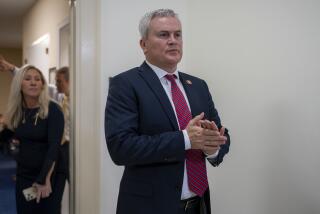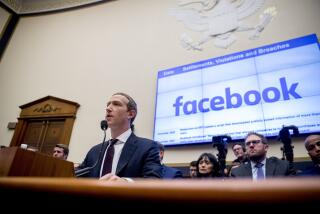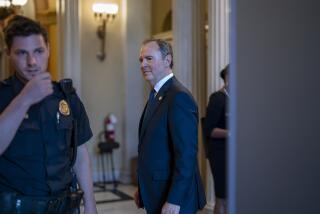WorldCom May Be in for a Grilling
- Share via
WASHINGTON — WASHINGTON -- WorldCom Inc., once the toast of Washington, will get a tougher reception this month when it comes to Capitol Hill to face inquires about its accounting scandal.
Through a series of broken promises and political missteps, WorldCom has managed to squander nearly all of the goodwill it enjoyed after it bought long-distance carrier MCI Communications Inc. and promised to deliver better telephone and Internet services to consumers.
“They are not going to get a good reception on the Hill,” said Blair Levin, a telecommunications analyst for Legg Mason Wood Walker Inc. and a former chief of staff at the Federal Communications Commission. “The level of hostility and anger is going to be high.”
Resentment against the company in Washington has been building for years, unlike on Wall Street, where WorldCom only recently incurred investor wrath after its disclosure last week that it wrongly listed $3.9 billion as capital expenses in 2001 and 2002.
It started when WorldCom reneged on a promise to keep MCI headquartered in Washington and dispersed employees to nearby suburban Virginia and WorldCom’s Clinton, Miss., headquarters.
Then WorldCom embarrassed federal regulators by failing to make good on a pledge to offer residential local phone service in competition to the regional Bell telephone companies. It wasn’t until April of this year that WorldCom struck a deal with Tampa, Fla.-based Z-Tel Technologies Inc. to offer bundled local and long-distance phone service in about 40 states. And critics said the program has not been aggressively marketed.
Opposing Lawmakers
But in perhaps its most damaging gambit, WorldCom spent last year battling powerful lawmakers who will have huge influence on the company’s fate.
The company was one of the leading opponents of the Internet Freedom and Broadband Deployment Act sponsored by House Energy and Commerce Committee Chairman W.J. “Billy” Tauzin (R-La.). WorldCom argued that the measure, which would free the Bell companies from federal rules requiring them to share their data lines with rivals, would make the Bells unregulated monopolies with vast power over telephone service and Internet access.
WorldCom--a relative newcomer on Capitol Hill with few political favors to dispense or collect--drew particular ire from Tauzin and Michigan Rep. John D. Dingell, the ranking Democrat on the House Energy and Commerce Committee, for its high-profile opposition to the measure.
It also didn’t help that WorldCom--which has made $7.5 million in political contributions since 1989--has funneled a good share of the money to Tauzin’s political enemies.
Sen. Ernest F. Hollings (D-S.C.), who has opposed Tauzin on a number of key telecom measures including Tauzin’s broadband bill, was the top Senate recipient of WorldCom money, with $32,166, according to the Center for Responsive Politics. Rep. Charles W. “Chip” Pickering, a Mississippi Republican who has defended his hometown company in its broadband dispute with Tauzin, was the top House recipient of the firm’s money from 1989 to 2002, receiving $82,050 in contributions.
WorldCom spokesmen in Washington, Mississippi and Texas could not be reached for comment. But House Energy and Commerce Committee spokesman Ken Johnson said it would be “idiocy” to view the committee’s inquiry into WorldCom as payback for its opposition to Tauzin’s broadband bill.
“We pray that WorldCom survives,” Johnson said. “We’re not out to get WorldCom; we are out to get the people that defrauded investors in WorldCom.”
Of course, more is at stake for WorldCom in Washington than public embarrassment.
Experts said the FCC may be pressured to crack down on WorldCom and other telecommunications carriers, especially if the nation’s consumers face any disruptions in phone or Internet service. What’s more, there already are nearly half a dozen bills circulating in Congress that seek to curb the kind of accounting activity that led to WorldCom’s downfall.
Additional Legislation
Rep. George Miller (D-Martinez) introduced legislation last month that would prohibit executives and corporate directors from receiving insider company loans of more than $50,000.
Former WorldCom Chief Executive Bernard J. Ebbers was forced out of the company after collecting about $400 million in personal loans from WorldCom that contributed to WorldCom’s financial downfall.
“We can’t afford to wait for the next corporate deception, followed by the next round of layoffs,” Sen. Paul S. Sarbanes (D-Md.) said in a radio address on behalf of Democrats that was aired Saturday. “We need to take action to restore public trust in our financial markets. And that begins with restoring public confidence in the accuracy of financial information.”
The action will start July 8, when the House Financial Services Committee summons WorldCom’s top current and former executives to testify. Asked to appear are CEO John W. Sidgmore, former Chief Financial Officer Scott D. Sullivan and Ebbers. Salomon Smith Barney telecom analyst Jack Grubman, who once was one of WorldCom’s most bullish supporters on Wall Street, also was subpoenaed.
Meanwhile, Tauzin and Rep. James C. Greenwood (R-Pa.), chairman of the Energy and Commerce subcommittee on oversight and investigations, have written to WorldCom, demanding that the company turn over various financial audits, business records and “indefeasible right of use” contracts by July 11. The latter documents, which are agreements to buy communications transmission capacity, figured prominently in the recent congressional investigations of telecom firm Global Crossing Ltd. Experts said IRUs have been an invitation for financial sleight-of-hand because they can be used to cloud the difference between corporate capital and operating expenses.
With Washington poised to take on the latest financial scandal, however, some experts cautioned lawmakers that they run the risk of further damaging the nation’s financial markets if they use the WorldCom hearings to grandstand.
“Aside from any sort of political gamesmanship that might go on, I think there is a real public service that needs to be done, and that is to restore the confidence the American public has in publicly traded corporations,” said Harold Furchtgott-Roth, a former Republican Federal Communications Commissioner, now a fellow at the American Enterprise Institute.
“If there is a perception that the practice of cooking accounting books is widespread, that will have a devastating effect on investor confidence.”
RELATED STORY
Investigation: SEC says “people will pay” if WorldCom lies. A7






